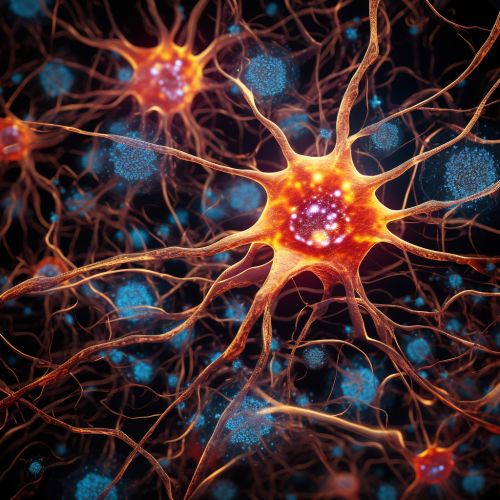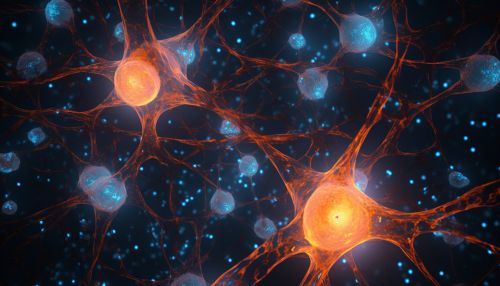Neuroglia
Introduction
Neuroglia, also known as glial cells or simply glia, are non-neuronal cells in the central nervous system (CNS) and the peripheral nervous system (PNS). They maintain homeostasis, form myelin, and provide support and protection for neurons. In the central nervous system, glial cells include oligodendrocytes, astrocytes, ependymal cells, and microglia, and in the peripheral nervous system, they include Schwann cells and satellite cells.


Classification
Neuroglia can be classified into four main types in the CNS: oligodendrocytes, astrocytes, microglia, and ependymal cells. In the PNS, the glial cells are Schwann cells and satellite cells.
Central Nervous System
- Oligodendrocytes are responsible for creating the myelin sheath, which acts as an insulator to speed up the electrical signals or action potentials that travel along the axon of the neuron.
- Astrocytes are star-shaped cells that provide physical and nutritional support for neurons. They regulate the external chemical environment of neurons by removing excess ions and recycled neurotransmitters.
- Microglia act as the first line of immune defense in the central nervous system. They are the smallest glial cells and change shape depending on the health of the surrounding environment.
- Ependymal cells line the ventricles of the brain and the central canal of the spinal cord. They are involved in the production of cerebrospinal fluid (CSF).
Peripheral Nervous System
- Schwann cells are responsible for the formation of myelin sheath in the peripheral nervous system. They also aid in the regeneration of damaged fibers.
- Satellite cells provide physical support to neurons in the ganglia of the peripheral nervous system.
Functions
Neuroglia perform numerous critical functions in both the CNS and PNS, including but not limited to, providing support and nutrition, maintaining homeostasis, forming myelin, and participating in signal transmission and the immune response.
Support and Nutrition
Astrocytes, one of the types of glial cells in the CNS, provide both physical and nutritional support for neurons. They provide neurons with nutrients and oxygen, regulate the concentration of ions and neurotransmitters in the extracellular space, and modulate synaptic transmission and plasticity.
Myelination
Oligodendrocytes in the CNS and Schwann cells in the PNS wrap around the axons of neurons to form a myelin sheath. This myelination increases the speed at which electrical impulses, known as action potentials, travel along the axon.
Immune Response
Microglia, the primary immune cells of the CNS, act as macrophages by engulfing and breaking down waste products in the CNS. They also mediate immune responses by releasing cytokines and presenting antigens to T-cells.
Pathology
Dysfunction or death of glial cells can cause or contribute to neurological disorders, including multiple sclerosis, Alzheimer's disease, Parkinson's disease, and amyotrophic lateral sclerosis (ALS).
